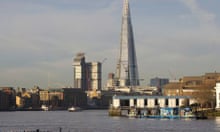Renzo Piano has a new honorific and the very sound of it makes him guffaw incredulously, his laugh echoing around the lofty ceilings of his grand office in Rome's 16th-century Palazzo Giustiniani. In his native Italy, the man who designed London's Shard, co-created Paris's Pompidou, brought the New York Times skyscraper to Manhattan and Kansai airport to Japan is no longer addressed simply as architetto. He is senatore, too – and, for that matter, a senator for life. "I still prefer architect," he admits, chuckling. "Not because I don't like senatore. It's a great honour. I'm just surprised."
Appointed by the president for their "outstanding patriotic merits", Italian life senators of the past have included such towering figures as seven-time prime minister Giulio Andreotti and Fiat boss Giovanni Agnelli. Many have been former presidents. When Piano, who is a debonair 76, got the call late last summer in the back of a New York cab, his immediate reaction was an endearing, almost indignant, disbelief. "I said, 'But I'm too young for this!' And he [president Giorgio Napolitano] said, 'No, you're not.'"
Several months on, Piano appears still to be grappling with the idea that he – the son of a builder from Genoa, the architectural rebel who came of age in restive 1960s Milan – is now a fully paid-up member of the establishment. Gallingly, the elevation has also exposed him to the mirth of his old friend Richard Rogers, whose own life peerage he had previously enjoyed teasing. "Now he is making the same joke with me," he smiles. "We were young 'bad boys' only some years ago. Now we are finding ourselves like wise old men."
What does a wise old man do, then, when he finds himself transformed into a senior political figure and recipient of an additional net salary of €170,000 per year? In Piano's case, the answer is clear, and he has wasted no time in setting it in motion. He is using all the money to employ a different group of young people every year – and, with their help, is leading a project that will prove his long-standing belief that "architecture is by definition a political job".
Piano, who is conscious of having grown up in a generation that fought to preserve Italy's exquisite historical town centres from the bulldozing zeal of modernisers, is grateful that crucial battle was waged and – to a certain extent – won. Now, though, he wants to turn his attention to the less lovely parts of Il Bel Paese, far from the Colosseum and the Rialto bridge: the suburbs. For a man who is already working on a new Palais de Justice on the northern edge of Paris and a campus for Columbia University in Harlem, it feels a natural progression. Piano has always believed that architecture is a kind of "civic poetry".
"I'm very happy about the beauty that was given to us by our ancestors," he says. "But that's by them. What I want to do with these young people is to build the beauty of tomorrow, to say, 'Can we transform the peripheries?'" He already has his six employees for 2014: three men and three women, all Italians under 40, who responded to an ad Piano's team placed anonymously to avoid publicity. It feels, he says, as if he is embarking on a marathon. But he has the rest of his days to get it done. "I don't know how long my life will be, but this is what I have in mind," he says. "Thank you for giving us such a beautiful country – but let's try now to transform what is not beautiful."
Born in 1937 in Pegli, on the western outskirts of Genoa, Piano lives a firmly international existence. He graduated from Milan's Politecnico university in 1964 but left the country soon after to wreak havoc on the unsuspecting citizens of Paris, London and beyond. Now, his legacy is writ large in structures across the globe – from the California Academy of Sciences in San Francisco to the Parco della Musica complex in Rome, and the Potsdamer Platz development in Berlin. His base is in Paris, with his wife, Milly, and their teenage son, but he travels widely and his firm, the Renzo Piano Building Workshop, has around 150 employees and offices in the French capital, Genoa and New York. (He also has three grown-up children from his previous marriage.)
The gravity of his new role in Rome, however, appears to have struck Piano forcefully and, inevitably, has redirected a lot of his attention back home. When he was taken to see his senate seat for the first time last year (and reminded that, while others were occupied on a transitory basis, his was for life), he "got that sense of pride. It's not personal pride, it's not national pride – it's more like institutional pride." And just in case he hadn't intimidated himself enough, he took a trip to the Roman Forum to inspect the senate building where votes were won and lost in Julius Caesar's day. "It's a long story," he says thoughtfully. "You feel part of that."
Some might say the senate that sits in Rome today suffers by comparison with its ancient equivalent: Italy's contemporary political debate is often drowned in invective and inglorious spats, a fact Piano experienced firsthand when he arrived to vote for the first time – on the day of Silvio Berlusconi's dramatic expulsion from the senate in November. The billionaire former prime minister's henchmen launched an attack on him for choosing that day for his debut. "I am used to being attacked by builders who don't like my work," Piano reportedly quipped, adding that he found being targeted by Sandro Bondi and Maurizio Gasparri, two of Berlusconi's allies, "sublime, pure bliss".
Piano is far more interested in examining how to "refertilise" the suburbs than attending every vote or immersing himself in Italy's fraught and frequently farcical party political scene. Moreover, he says, eyes glinting through spectacles, "It's the only thing I'm quite good at." One idea would be to give the suburbs more public buildings – structures that, in Italy's fragile terrain, are seismically safe as well as green and civic-spirited.
Although many want him to declare his political colours, Piano claims to be "independent but not indifferent". When news of his appointment first spread, he was hailed by some as a Grillino – a supporter of ex-comedian Beppe Grillo's rambunctious Five Star Movement. Incidentally, it was Grillo, Piano's old friend, who started the rumour that the Pritzker prizewinner had dreamed up the idea of the Shard from a wedge of parmesan the pair had once eaten at dinner. "He went to sell the English a piece of cheese!" he said. "He's a real genius."
Piano's periferie project goes beyond party divides – and is, many would argue, rather more noble in its own quiet way than much of the fudged policy-making and furious rhetoric that passes for politics in 21st-century Italy. "This is not left or right or Grillo," says Piano. "This is reality. The reality of a beautiful country that must be defended."




Comments (…)
Sign in or create your Guardian account to join the discussion